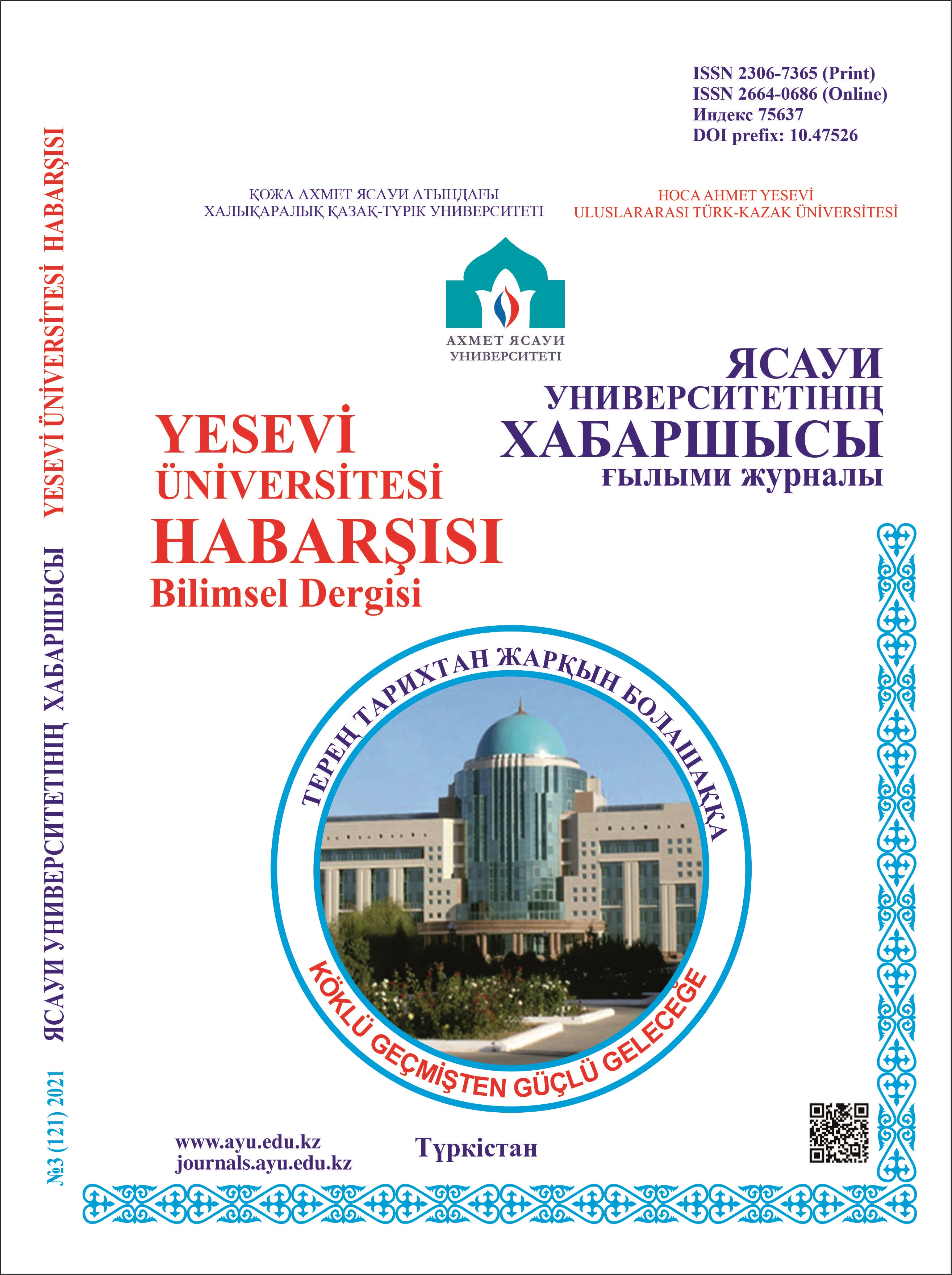Assessment of The Cybersecurity Knowledge Level of Future Primary Education Teachers
73 54
Keywords:
cybersecurity, cybersecurity knowledge, information security, statistical analysis, primary education, knowledge level.Abstract
Information security is one of the pressing issues of modern society. While new information exchange technologies are fast and efficient, problems related to data confidentiality and security are increasing. These threats play a particularly significant role in the field of education. This study aimed to assess the level of cybersecurity knowledge among future primary education teachers at Korkyt Ata Kyzylorda University. The primary goal of the research was to determine students' knowledge level in cybersecurity and the factors influencing it. These factors include gender, year of study, participation in specialized courses, and the devices used during classes. A quantitative research method was employed in the study. Data analysis was conducted using SPSS Statistics 29, a powerful tool for processing data, performing statistical analysis, and visualizing results. The analysis used statistical methods, including the Mann-Whitney U test, to evaluate differences between two independent groups. Kruskal-Wallis test: to identify differences among several independent groups. Correlation analysis: to identify relationships between variables. Cronbach’s alpha coefficient: to assess the reliability of the research questionnaire. Results: There was no statistically significant difference in cybersecurity knowledge levels based on gender (p=0.817). Senior students (3rd and 4th year) demonstrated significantly higher knowledge levels than junior students (1st and 2nd year) (p=0.037). While students who participated in specialized courses had higher knowledge levels compared to those who did not, the difference was not statistically significant (p=0.097). Students using mobile phones during classes did not differ significantly in knowledge levels from those using laptops, tablets, or desktop computers (p=0.456). The findings emphasize the importance of cybersecurity education, particularly for senior students. Furthermore, the widespread use of mobile devices highlights the need to improve teaching methods related to cybersecurity. This study provides a foundation for future research aimed at enhancing knowledge in this area.
References
ПАЙДАЛАНЫЛҒАН ӘДЕБИЕТТЕР ТІЗІМІ
The Importance of Cybersecurity Education in School // Int. J. Inf. Educ. Technol. – 2020. – Т. 10, №5. – P. 378–382. https://doi.org/10.18178/ijiet.2020.10.5.1393
Cybersecurity [Electronic resource]. URL: https://www.itu.int:443/en/ITU-T/studygroups/com17/Pages/cybersecurity.aspx (date of access 25.09.2024)
Karpiuk M., Pizło W., Kaczmarek K. Cybersecurity management – current state and directions of change // Int. J. Leg. Stud. IJOLS. – 2023. – Т. 14, №2. – P. 645–663. https://doi.org/10.5604/01.3001.0054.2880
Czuryk M. Cybersecurity and Protection of Critical Infrastructure // Stud. Iurid. Lublinensia. – 2023. – Т. 32, №5. – P. 43–52.
Karpiuk M. The Provision of Safety in Water Areas: Legal Issues // Stud. Iurid. Lublinensia. – 2022. – Т. 31, №1. – P. 79–92. 6. Karpiuk M. Constitutional Competence of the Sejm in the Field of National Security // Stud. Iurid. Lublinensia. – 2018. – Т. 26, №4. – P. 9.
ITU: Connecting the world and beyond [Electronic resource]. URL: https://www.itu.int:443/ru/Pages/default.aspx (date of access 25.09.2024)
NICE // NIST. 2016.
Home // ECSO. [Electronic resource]. URL: https://ecs-org.eu/ (date of access 25.09.2024)
Al-Janabi S., Al-Shourbaji I. A Study of Cyber Security Awareness in Educational Environment in the Middle East // J. Inf. Knowl. Manag. – 2016. – Т. 15, №01. С. 1650007. https://doi.org/[CrossRef]
Ahmed N. et al. Cybersecurity awareness survey: An analysis from Bangladesh perspective // 2017 IEEE Region 10 Humanitarian Technology Conference (R10-HTC). – 2017. – P. 788–791.
Alotaibi F. et al. A survey of cyber-security awareness in Saudi Arabia // 2016 11th International Conference for Internet Technology and Secured Transactions (ICITST). – 2016. – P. 154–158.
Senthilkumar K., Easwaramoorthy S. A Survey on Cyber Security awareness among college students in Tamil Nadu // IOP Conf. Ser. Mater. Sci. Eng. – 2017. – Т. 263. – С. 042043.
L. C. Amo и др. Cybersecurity Interventions for Teens: Two Time-Based Approaches // IEEE Trans. Educ. – 2019. – Т. 62, №2. – P. 134–140.
Rahim N.H.A. et al. A systematic review of approaches to assessing cybersecurity awareness // Kybernetes. – 2015. – Т. 44, №4. – P. 606–622.
Giannakas F. et al. A comprehensive cybersecurity learning platform for elementary education // Inf. Secur. J. Glob. Perspect. – 2019. – Т. 28, №3. – P. 81–106. https://doi.org/10.1080/19393555.2019.1657527
Kamara S., Lauter K. Cryptographic Cloud Storage // Financial Cryptography and Data Security / Ed. Sion R. et al. – Berlin, Heidelberg: Springer Berlin Heidelberg, 2010. Т. 6054. – P. 136–149.
Fatokun F.B. et al. The Impact of Age, Gender, and Educational level on the Cybersecurity Behaviors of Tertiary Institution Students: An Empirical investigation on Malaysian Universities // J. Phys. Conf. Ser. – 2019. – Т. 1339, №1. – С. 012098.
McGill T., Thompson N. Exploring potential gender differences in information security and privacy // Inf. Comput. Secur. Emerald Publishing Limited. – 2021. – Т. 29, №5. – P. 850–865.
An Q. et al. How education level influences internet security knowledge, behaviour, and attitude: a comparison among undergraduates, postgraduates and working graduates // Int. J. Inf. Secur. – 2023. – Т. 22, №2. – P. 305–317.
Huraj L. et al. Measuring Cyber Security Awareness: A Comparison between Computer Science and Media Science Students // TEM J. – 2023. – P. 623–633.
Azzeh M. et al. Adopting the cybersecurity concepts into curriculum: the potential effects on students’ cybersecurity knowledge // Indones. J. Electr. Eng. Comput. Sci. – 2022. – Т. 25, №3. – С. 1749.
Affia A.O., Nolte A., Matulevičius R. Integrating Hackathons into an Online Cybersecurity Course // Proceedings of the ACM/IEEE 44th International Conference on Software Engineering: Software Engineering Education and Training. – 2022. – С. 134–145.
Alsaleh M., Alomar N., Alarifi A. Smartphone users: Understanding how security mechanisms are perceived and new persuasive methods // PLOS ONE / ed. Choo K.-K.R. – 2017. – Т. 12, №3. – С. e0173284.
Calderwood F., Popova I. Smartphone Cyber Security Awareness in Developing Countries: A Case of Thailand // Emerging Technologies for Developing Countries / ed. Zitouni R., Agueh M. Cham: Springer International Publishing, 2019. – Т. 260. – P. 79–86.

